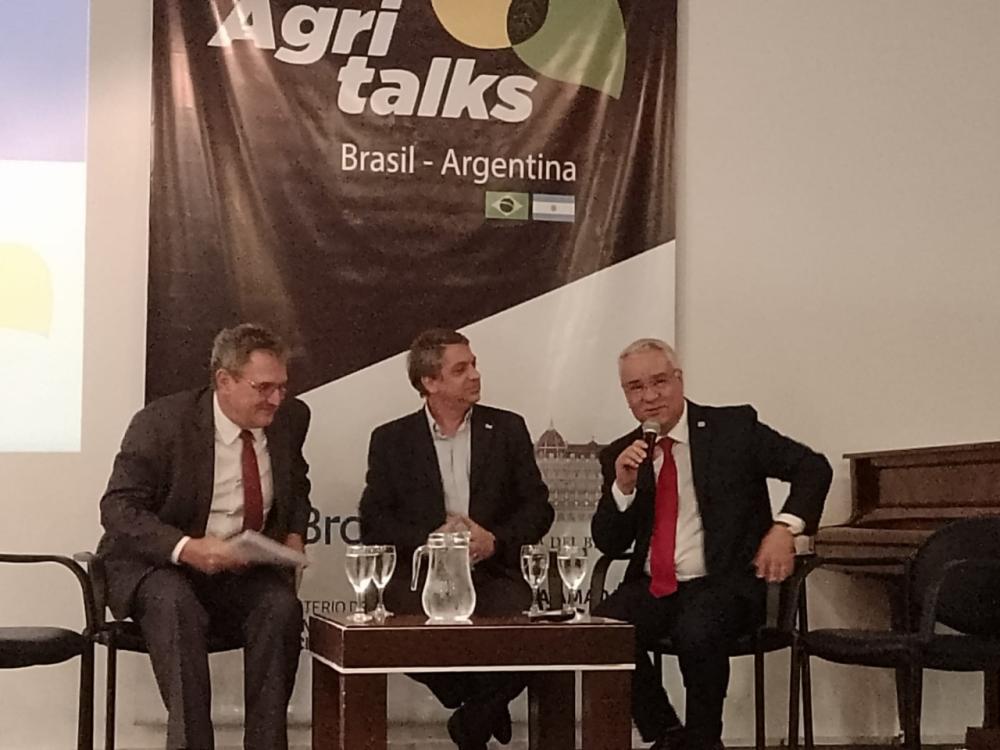Brazil and Argentina have the opportunity to be key players in global food security, said officials and specialists in a panel discussion in which IICA participated

Buenos Aires, 14 December 2022 (IICA). Argentina and Brazil, two of the world’s leading food exporters, have a huge opportunity to boost their economic and social development through the agriculture sector, and are destined to be key players in global food security. This was the opinion of representatives of the public and private sectors attending a high-level event organized by the Brazilian Embassy in Buenos Aires in which the Inter-American Institute for Cooperation on Agriculture (IICA) took part.
The meeting was part of AgriTalks, a series of conferences that Brazil’s Foreign Ministry has been hosting in different embassies around the world with the aim of promoting good agricultural practices and discussing the outlook for the sector, given the burgeoning global demand for healthy, nutritious and sustainably produced food.
The Secretary of Agriculture, Livestock and Fisheries of Argentina, Juan José Bahillo, Brazil’s Ambassador to Argentina, Reinaldo Salgado, and the IICA Representative in Argentina, Fernando Camargo, too part in the opening and closing of the meeting.
“Argentina and Brazil are two countries with a common destiny. Brazil is our main strategic partner in foreign trade, and we face similar challenges in strengthening our agri-food chains. In recent years, we were obliged to incorporate new paradigms due to the pandemic, which put this region’s capacity to produce food to the test, and due to the war in Europe, which has made markets volatile and unstable,” noted Bahillo.
The secretary emphasized the need for the two countries, and the entire region, to work together, explaining why: “We have high productivity with a low environmental impact, and together we provide a large percentage of the animal protein the world consumes. Our production is part of the solution to the hunger faced by 800 million people around the world, and to the nutritionally inadequate diet of a further 3.5 billion.”
Bahillo also pointed out that the Latin American countries had not been the main drivers of climate change, and had, in fact, become its victims: “We are suffering the effects of other production models.”
Ambassador Salgado then commented that relations between Brazil and Argentina were underpinned by the interdependence of their productive sectors and close cooperation in strategic sectors such as science, technology and innovation.
“The relationship is essential and strategic; it serves the permanent interests of both countries. Their bilateral trade in agricultural products is worth USD 5.3 billion per year,” Salgado added. He maintained that the present crisis in various countries is creating new challenges and opportunities for nations like Argentina and Brazil, which should promote sustainability and close collaboration between governments and producers.
Fernando Camargo remarked that sustainability and innovation were “the two key concepts that show us the way forward and the future of the agriculture sector in Argentina, Brazil and the rest of the region,” and stressed that conferences of this kind provided tools for tackling the challenges faced by food production in a context of crisis, and helping stakeholders to find solutions.
The resilience of agriculture in the region
Argentina’s Undersecretary for Political Coordination at the Ministry of Agriculture, Ariel Martínez, also took part in the activity, and recalled that, when the pandemic began serious doubts were raised about Latin American countries’ ability to guarantee food security for their own populations, and to continue exporting.
“Production across the region demonstrated great resilience at a time of severe global crisis. That’s why we say our systems have room for improvement, but don’t need transforming, because they’ve shown they can respond,” Martínez remarked.
The official said that the countries of the region, with significant support from IICA, were managing to reverse the narrative surrounding food production in Latin America and the Caribbean, which was very negative.
“Our countries,” he observed, “don’t deny the issues involved in climate change, our countries are suffering its effects. Our worry is that we may add another problem to climate change, which could be food insecurity, by trying to transform agri-food systems that have shown themselves to be productive and sustainable.”
Marcos Jank, from the Brazilian Center for International Relations (CEBRI), emphasized the need to ensure there were no unjustified barriers to international food trade. “The world wants food security, environmental sustainability, human, animal and plant health, and high nutritional quality. That isn’t achieved with closed markets, but with open ones.”
Jank said the last 30 months had been the most challenging in history for agri-food systems, due to the COVID-19 pandemic and the impact of the war in Eastern Europe, which had triggered rising prices and depleted stocks. “Despite all that, the value of Brazil’s agricultural exports this year is 50% higher than in 2020. We see an opportunity in agriculture like never before. And we’re certain that all the difficulties the world is experiencing will be resolved with more trade,” he concluded.
More information:
Institutional Communication Division.
comunicacion.institucional@iica.int